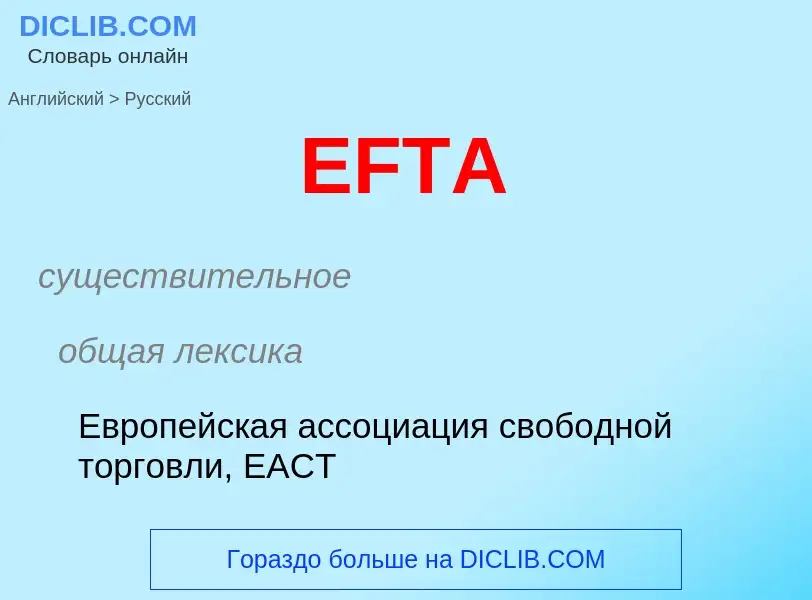Traducción y análisis de palabras por inteligencia artificial ChatGPT
En esta página puede obtener un análisis detallado de una palabra o frase, producido utilizando la mejor tecnología de inteligencia artificial hasta la fecha:
- cómo se usa la palabra
- frecuencia de uso
- se utiliza con más frecuencia en el habla oral o escrita
- opciones de traducción
- ejemplos de uso (varias frases con traducción)
- etimología
EFTA - traducción al ruso
существительное
общая лексика
Европейская ассоциация свободной торговли, ЕАСТ
синоним
Wikipedia
The European Free Trade Association (EFTA) is a regional trade organization and free trade area consisting of four European states: Iceland, Liechtenstein, Norway and Switzerland. The organization operates in parallel with the European Union (EU), and all four member states participate in the European Single Market and are part of the Schengen Area. They are not, however, party to the European Union Customs Union.
EFTA was historically one of the two dominant western European trade blocs, but is now much smaller and closely associated with its historical competitor, the European Union. It was established on 3 May 1960 to serve as an alternative trade bloc for those European states that were unable or unwilling to join the then European Economic Community (EEC), the main predecessor of the EU. The Stockholm Convention (1960), to establish the EFTA, was signed on 4 January 1960 in the Swedish capital by seven countries (known as the "outer seven": Austria, Denmark, Norway, Portugal, Sweden, Switzerland and the United Kingdom). A revised Convention, the Vaduz Convention, was signed on 21 June 2001 and entered into force on 1 June 2002.
Since 1995, only two founding members remain, namely Norway and Switzerland. The other five, Austria, Denmark, Portugal, Sweden and the United Kingdom, had joined the EU at some point in the intervening years. The initial Stockholm Convention was superseded by the Vaduz Convention, which aimed to provide a successful framework for continuing the expansion and liberalization of trade, both among the organization's member states and with the rest of the world.
Whilst the EFTA is not a customs union and member states have full rights to enter into bilateral third-country trade arrangements, it does have a coordinated trade policy. As a result, its member states have jointly concluded free trade agreements with the EU and a number of other countries. To participate in the EU's single market, Iceland, Liechtenstein, and Norway are parties to the Agreement on a European Economic Area (EEA), with compliances regulated by the EFTA Surveillance Authority and the EFTA Court. Switzerland has a set of bilateral agreements with the EU instead.



